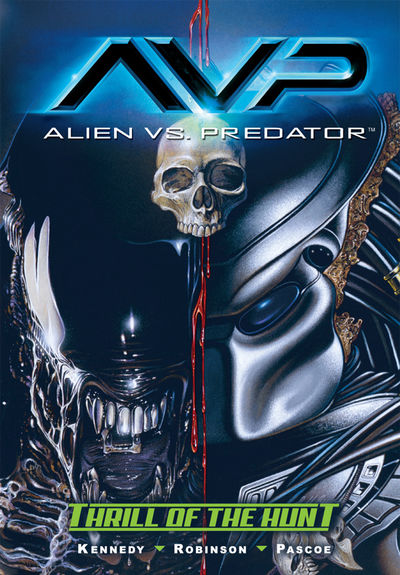 Dark Horse: The Aliens and Predator creatures are now legendary icons of science fiction, was it intimidating writing for characters with such a legacy?
Dark Horse: The Aliens and Predator creatures are now legendary icons of science fiction, was it intimidating writing for characters with such a legacy? Mike Kennedy: Only in the sense that these characters are so engrained in everyones imagination, and we want to be true to those memories and images. Having had a chance to work with other iconic characters in the past (Star Wars, Superman, etc.), it gets a bit easier to find the limits of how far you can push the existing envelope. You want to bring something new to the characters, but you donÂ’t want to upset the applecart or contradict anything thatÂ’s already been written. And there has been SO MUCH written with these characters already. Maintaining continuity was the first concern, but weve set this story far enough apart from the others to avoid any major conflicts.
DH: What are the challenges writing for characters such as these, essentially monsters without traditional languages?
MK: Creating believable personalities in human characters is the expected challenge, but having the benefit of dialogue and banter makes that a much easier challenge to tackle. The fun comes in painting personalities without that benefit. It’s like playing charades, using body language and expressive reaction to suggest what's going on behind the eyes. I always felt that there was a lot more to both of these species than just “kill, maim, kill”, and suggesting those deeper layers of thought through body language or choice of action was a very exciting challenge. I also didn’t want the monsters, particularly the Predator, to be too predictable, so giving him a unique, albeit mysterious, thought process was a great opportunity. In fact, that’s what drew me to this gig—exploring what truly makes the Predator dangerous. It’s not all the fancy technology and weaponry. Give me an invisibility suit and laser cannon and I’d be pretty frightening, too! Nah, I believe they’ve got a brain for efficient killing and could finish the job with a Spongebob lunchbox and a popsicle stick.
DH: Is it hard to convey horror and suspense in the comic format? How is that best accomplished?
MK: I remember reading a lot of EC comics as a kid and being “horrified”, but rarely “scared” (at least not until later that night, after the lights went out, and my memory started working overtime). Horror is easier in comics since it’s about manipulating the reader’s reaction by showing them something unsettling. Suspense on the other hand is the result of NOT showing something, threatening the audience with their own imagination and worse-case-scenarios. When done right, Suspense is like being on a crashing airplane: you’re helpless to do anything but watch and wait. And since the readers can turn the pages of a comic at their own pace or even flip ahead several pages to see what’s in store for the characters, it takes a lot of that fear-management out of the writer’s hands. Readers have total control their environment—they can listen to their own music, set their own lighting, etc, etc. They can break any Suspense at will. But that’s not to say it can’t be done; it just relies a lot on the willingness of the reader to adhere to the story’s delivered pace. And it’s a lot more challenging to establish that much emotional commitment and sensory immersion in such a short form as comics.
DH: Did you have much freedom with these characters or were there a lot of specific guidelines you had to follow?
MK: There wasnÂ’t a list of guidelines per se, but IÂ’m sure if IÂ’d offered some totally outlandish suggestions, theyÂ’d have hit me with one overnight. And IÂ’m sure it would have been thick. Since these are such legendary creatures (that I myself have followed as a fan), it was fairly easy to stay within the boundaries of their character. At the same time though, we wanted to show some fresh perspective on some of their behaviors, so there was some discussion about whether certain actions would be appropriate. Most of them were deemed okay.
DH: While this is not an adaptation, will we see characters and events from the film in more depth or does this book go in a different direction altogether?
MK: This book has very little to do with the film outside of the relationship it establishes between the two species. Our story takes place a few hundred years in the future, as opposed to the contemporary setting of the film. Both stories will support and complement each other without giving each other's secrets away.
DH: ItÂ’s been a long tradition of the science fiction/horror genre to pit monsters against one another, why do you think we love to see our favorite bad guys go at each other?
MK: The movie’s tagline says it all: “Whoever wins, we lose.” (Unless of course they both lose, in which case, I guess, we win...?) I think the monster-battle genre is just a fantastic extension of man’s age-old love of combat sport. Gladiators, professional wrestlers, football players, superheroes... they all offer the same exciting question: who will emerge superior? The question becomes even more intriguing when the combatants possess unique abilities and unfathomable thought processes. The Romans used to throw tigers in pools of alligators to entertain the crowds. Now, in this age of PETA and Greenpeace, we’ve gotta invent animals to throw into the fighting pit. So why not make them wild, imaginative space creatures?